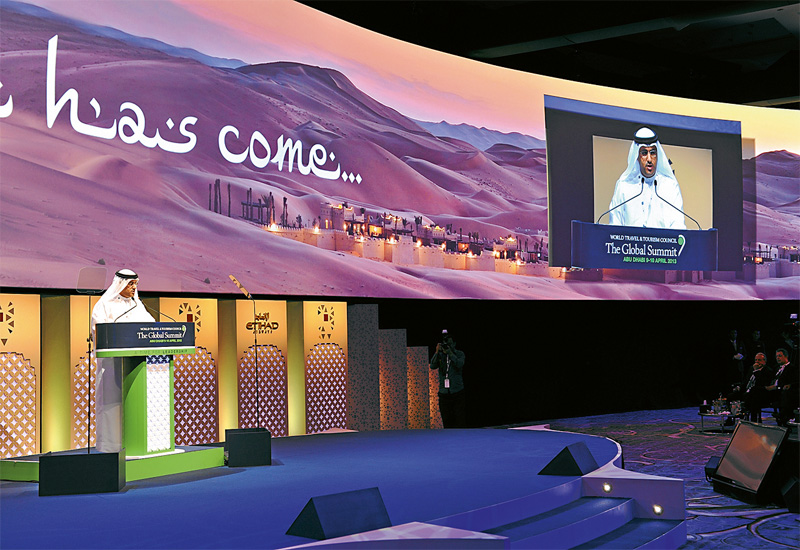 His Excellency Mubarak Al Muhairi, director general, Abu Dhabi Tourism & Culture Authority opened the summit.
His Excellency Mubarak Al Muhairi, director general, Abu Dhabi Tourism & Culture Authority opened the summit.
Guy Wilkinson reports from the World Travel and Tourism Council Global Summit in Abu Dhabi, where leadership, taxation, sustainability and technology ranked high on the agenda:
The arrival of the 13th World Travel and Tourism Council Global Summit in Abu Dhabi was a momentous occasion for the capital, with Abu Dhabi Tourism & Culture Authority (TCA Abu Dhabi) and Etihad Airways recently joining forces to host the event at Jumeirah at Etihad Towers on April 9-10.
The event theme was ‘A time for Leadership’, with David Scowsill, president and CEO of the World Travel & Tourism Council (WTTC) calling on the tourism industry “to grasp the mantle of leadership in order to influence”.

| Advertisement |
In his opening speech, Scowsill urged the 1000-strong delegates to “not only influence at industry level but at world level, not only within government chambers, but in boardrooms, in the media, amongst employees and within supply chains”.
“Leadership is about influence,” stated Scowsill. “How do we facilitate the growth of our industry responsibly and sustainably, without destroying our planet in the process? How do we manage the growth in demand for international travel from the two billion new middle class consumers emerging from burgeoning economies of China and India? How do we prepare for the next one billion international travellers crossing country borders each year?”
While the first day of the conference provided a broad brush overview of these issues — with the keynote speech from president Bill Clinton challenging industry leaders to take the mantle of economic responsibility with tourism as the game changer — the second day tackled the specifics behind Scowsill’s last question.
Up in the Air
A tripartite session entitled ‘Getting ready for the next one billion’ was logically split between focuses on aviation, hotels and other sector players such as cruise lines, railways and travel companies. Moderator Peter Greenburg, travel editor of CBS News, introduced the session by commenting that global airlines achieved a margin of just 1.3% in 2012.
Keynote speaker James Hogan, CEO of Etihad Airways, quoted IATA data showing that Middle East airlines’ passenger traffic was up 10.6% in 2012, compared to 3.7% worldwide. He referred in particular to the advantages enjoyed by young Gulf airlines such as Etihad, Emirates and Qatar Airways, compared to the ‘legacy’ airlines of the US, Europe and the Far East.
“We started [Etihad] with a clean sheet of paper. We were not burdened by the legacy handcuffs, whether they be union agreements, infrastructure agreements or multi hubs,” stated Hogan.
Quoting impressive figures for Etihad (73 aircraft serving 83 direct destinations, 90 planes on order, 10 million ‘guests’ served in 10 years), he said the airline had codeshare partnerships with 42 airlines and minority equity investments in four other carriers.
Of Etihad’s 14,500 staff, 1000 were Emiratis, including an all-female call centre in Al Ain.
In the lively panel session that ensued, Willie Walsh, CEO of International Airlines Group (the parent company of British Airways, Iberia and bmi) admired the advance of Dubai from the world’s 99th hub airport in 1999 to number two in 2012, characterising the Gulf as the opposite to Europe, thanks to its excellent infrastructure and absence of government restrictions.
He was particularly critical of European airport taxes — especially the British ‘Air Passenger Duty’ — a view that was passionately reiterated by various speakers throughout the day.
“Not a single penny goes to the industry or the environment,” he stated. “A recent PricewaterhouseCoopers report shows that if you scrap the tax, you actually boost the economy.”
Martin Craigs, CEO of the Pacific Asia Travel Association, added: “To you hoteliers who think this has nothing to do with you, I would politely suggest that it has a lot to do with your beloved development pipeline, (which) will be blocked if you do not allow passengers to get to your facilities.”
Article continues on next page ...








 Search our database of more than 2,700 industry companies
Search our database of more than 2,700 industry companies









